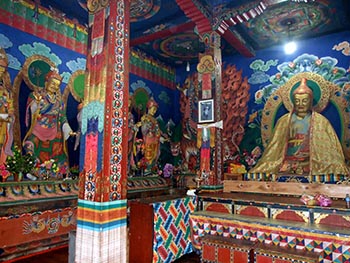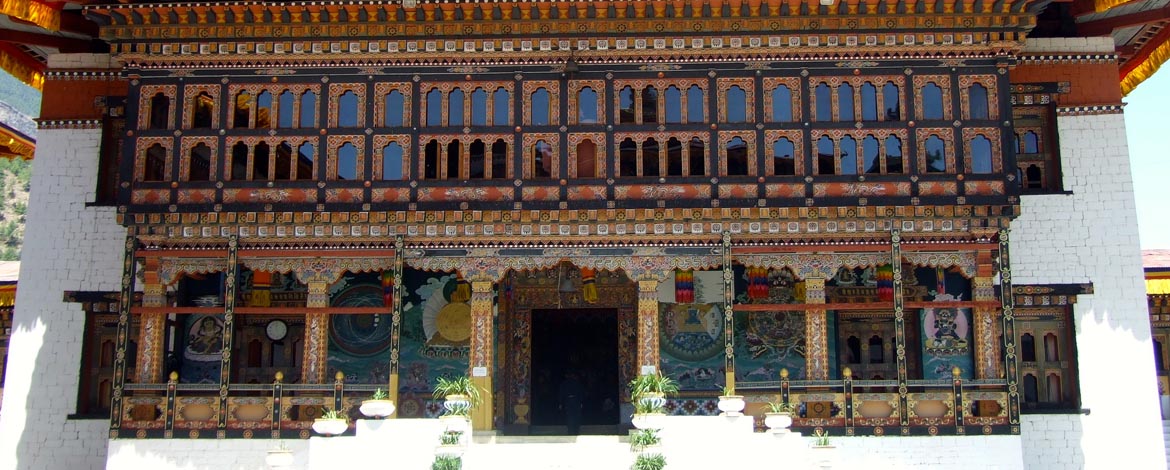Bhutan’s Unique Buddhist Culture Has Tourism Potential
By Kalinga Seneviratne, IDN-InDepthNews, 11 May 2023 (IDN/LCN)
SINGAPORE | THIMPHU -- A recent visit by a group of Vietnamese Buddhists to learn and experience the Mahayana tradition of Buddhism has alerted the Bhutan authorities to the potential of Buddhist cultural tourism to one of the world’s most scenic countries landlocked between India and China in the Himalayan mountains.
Punakha Dzong in Punakha near Thimphu is a large Buddhist monastic temple and education institution. Credit: Kalinga Seneviratne
Bhutan which was opened to tourism only about three decades ago has been marketing itself for the scenic beauty of its Himalayan mountainous landscape mainly to western and young Asian adventure tourists coming here for trekking and bird watching.
As the Himalayan Buddhist kingdom struggles to revive its fledgling tourism industry, the arrival of 238 Vietnamese Buddhist visitors seeking a Mahayana Buddhist experience has opened industry eyes to a potentially lucrative market—rich Asian Buddhists.
“Bhutan is the last surviving Himalayan Mahayana (Vajrayana) Buddhist Kingdom, and here Buddhism is part of our daily life. Almost all homes, government institutes, and private companies would have an altar and start their day or end the day with prayers seeking refuge in the Dhamma (teachings)”, explained Dawa Penjor, who runs ‘Lungta’ tourism company in Bhutan. “When people visit Bhutan, you'll experience the elements of our Buddhist way of life in all aspects of your journey.”
Bhutanese communications specialist and former spokesman for the King, Dr Dorji Wangchuck, argues that the Bhutanese Buddhist way of life will be appealing to Asian Buddhists to come here and experience. “Bhutan practices Mahayana and Vajrayana Buddhism that does not advance the dhamma in a nihilistic manner but embraces whatever comes in life with moderation, compassion and loving kindness. It is founded on the Middle Path Philosophy,” he told Lotus Communication Network (LCN).
An editorial in Bhutan’s Kuensel newspaper noted after the visit of the Vietnamese last month: “We may not have thought about marketing Bhutan as a pilgrimage destination, but Bhutan sure can believe it to be one. We preserved and promoted Buddhism, cultures and traditions and the belief systems around it not to attract pilgrims. But it sure is the biggest selling point in today’s marketing context”.
“I have always opined that Bhutan is an important destination for Buddhist pilgrimage and we need to promote that. I see great potential here to develop it further,” notes Wangchuck.
 << The colourful interior of Bhutanese Buddhist temples. Credit: Kalinga Seneviratne
<< The colourful interior of Bhutanese Buddhist temples. Credit: Kalinga Seneviratne
But both Penjor and Wangchuck believe that Buddhism should not be commercialised for purely financial gains, because it will go against the very reasons why Buddhist cultural (and pilgrim) tourists want to visit the Buddhist kingdom.
“Here we don't try to sell our Buddhist beliefs as merchandise or tour packages. Buddhist pilgrims explore Bhutan like any Bhutanese and it helps them connect directly with people. A visit to Bhutan provides visitors with insights into the way of Mahayana Buddhism practiced by our ancestors,” Penjor told LCN.
Thousands of Bhutanese go on Buddhist pilgrimage to India and even further to Nepal, Sri Lanka and Thailand every year. Some even spend their life savings to visit Bodhgaya—the sacred place of Gautama Buddha’s enlightenment—because as Kuensel says: “It is the wish of children to fulfill the dream of the parents to at least visit Bodh Gaya, once in their lifetime”.
But now the flow of Buddhist pilgrims could be reversed. Puay Kim Teo, a Singaporean tourism trainer was trying to do just that when he formed ‘Bodhi Travel’ in partnership with Bhutan’s national carrier Druk Air to create Buddhist tourism packages to Bhutan and other Buddhist destinations across Asia. As the momentum was picking up, the pandemic dealt a heavy blow to the project.
“Bhutan as a pilgrimage destination, it is really about positioning,” argues Teo. “Given that Bhutan is mainly Vajrayana tradition, it is appealing to those who are drawn to Vajrayana Buddhism. I have been hearing about the popularity of Vajrayana practice in Vietnam.”
However, Teo points out some weaknesses of Bhutan’s tourism industry. “Personally I think Bhutan can be a good sell on pilgrimage tourism if there are good masters there. However, this is the dichotomy. The masters should be supported for their wisdom and not for tourism,” he told LCN.
“I tried to resolve that by trying to groom Buddhist guides who are lay people with adequate knowledge of Buddhism. They will fill in the gap between the normal lay practitioners and the Sangha (monks). Being lay, they have greater flexibility in their behaviour. The intention of Bodhi Travel was to introduce Buddhism and not to teach Buddhism,” said Teo, himself a Buddhist, adding, “the difficulty I faced was the grooming of such travel guides and giving them a (sustainable)livelihood”.
If Bhutan is to develop Buddhist cultural tourism it would obviously have to include greater mingling and integration of the tourism packages with local communities. Bhutan have thousands of Buddhist temples and monasteries spread across the predominantly Buddhist country. The interior of temples are very colourful and so are the ceremonies and festivals. Liberalism of Buddhism makes it possible for outsiders to mingle with devotees as long as respect is shown for the local culture.
“If Buddhist pilgrims from around the world come and stay in the monastic institutes, there will be automatically the so-called trickle down effects on the local communities. In the least of cases, the temples and monasteries will be able to stay afloat, thus benefiting the local community and the country,” argues Wangchuck.
Penjor explained to LCN how they have developed tourism packaged so that visitors learn and integrate with the local Buddhist culture, while financial benefits will trickle through to the local temples and communities. Among the packages they have developed is a week-long tour that gives the visitor glimpses of Bhutan’s spiritual and wellness culture.
Another “immersion” package allows tourists to visit temples, participate in ceremonies and festivals. And the third is a “pilgrim” package that “provides visitors with a unique insight into life in the mystic Himalayan kingdom and the holy Vajrayana tradition” while letting you to explore its striking landscapes.
“As far as our tours are concerned, we have always involved the local communities and designed our packages considering their benefits,” Penjor told LCN. “For instance, we use the local service and accommodations when our visitors are on pilgrimage trips. We use homestays instead of hotels and provide a certain amount of our revenue as donations to the monasteries and temples and also help with education of young monks”.
Kuensel points out that if Bhutan is to refocus its tourism promotion to target the Asian market, reskilling of tourism staff may be needed such as language skills in Thai, Vietnamese, Japanese or Korean, training chefs to cook simple and delicious vegetarian food and the capacity to attend to large groups of pilgrims.
Travelling to Bhutan is expensive though because of a “tourist tax” where you need to pay a travel agent $200 a day to get your visa. It is offset against hotel and other costs and non-refundable. This is often described by government sources as “high value, low impact” tourism coined with ideas of sustainable development.
“Personally I think Bhutan will be a hard sell due to the tourism tax,” says Teo, who believes that offering Buddhist wisdom in a modern setting would be an attractive preposition for Bhutan to explore. “Let Bhutan be a wellness destination where overworked executives can detox. Set up wellness centres with meditation classes and talks etc.”
--------
This Lotus News Feature, produced in association with the Buddhist Channel, is the 53rd in a series of joint productions with IDN-InDepthNews, the flagship agency of the Non-profit International Press Syndicate.


 << The colourful interior of Bhutanese Buddhist temples. Credit: Kalinga Seneviratne
<< The colourful interior of Bhutanese Buddhist temples. Credit: Kalinga Seneviratne